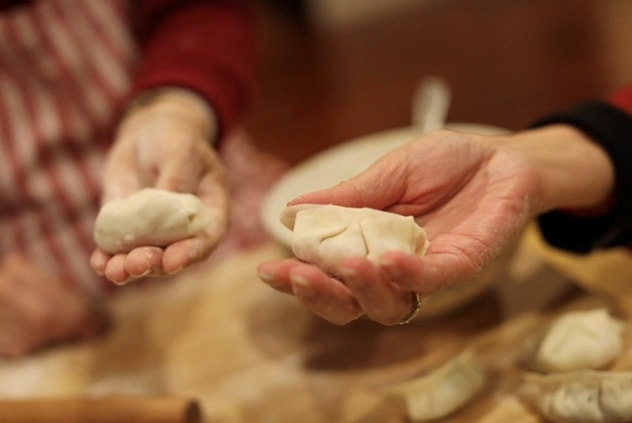|
Sydney Chan (Editor's note: Sydney Chan is a senior at The Bishop's School. Sydney was a recipient of Scholarship for API Student Internship 2023 for API Student Journalism Internship. This is one of the three articles she wrote for the program) Friends gather to make dumplings for dinner that night. Dumplings, among many other foods in Chinese cuisine, mean far more than their deliciousness –– each dish holds priceless memories (Photo by Samson Chan) Your mouth waters as the aroma of freshly boiled dumplings fills your nose. It’s the end of the work week, and you could not be more ready to unwind and spend time with your loved ones. “饭好了 (fàn hǎole/food is ready)” your mother calls from the kitchen.
In traditional Chinese culture, dumplings symbolize wealth and prosperity. The origin of the word dumpling in Mandarin Chinese is not the most clear, but some believe the name could have been linked to the Sung Dynasty (960-1279 AD), a time period of unparalleled growth in China. This era of economic success led to the creation of one of humankind’s first paper currencies, “jiaozi.” The word eventually came to name the handmade pockets of love we all know and enjoy today. It is customary in Chinese families to eat as many dumplings as they can on Lunar New Year. Crescent dumplings look similar to the boat-shaped gold ingots found in China; and therefore, the more dumplings you eat that night, the more wealth and prosperity you will supposedly receive in the New Year. Some may continue to argue that we eat dumplings on New Year’s (and frankly, as often as we can) just because they’re good. And to that, I say, yes. That’s also true. For many children of Chinese descent, dumplings are our everything. Those small bites of umami are more than just pockets filled with savory juices and aromatic smells; they are joy, a way of life, and some of my best memories. I will forever reminisce upon making dumplings with my grandparents every time they came to visit from Beijing since I was five. Dumplings are not the only food in Chinese cuisine that has cultural significance; long noodles symbolize prosperity and mandarin oranges emanate good luck, to name a few. But over the years, I’ve come to realize that it’s not just the direct symbolic meaning of different foods that make them significant–– it’s the people you eat them with that will always matter the most. Chinese hotpot is more than a food. Not only is it a delicious culinary experience, but it requires family and friends to slow down from their everyday busy life for a couple of hours to connect and share a meal. The pot of boiling soup base resides in the center of the large table, allowing for loved ones to cook and eat while catching up on each other’s lives. While many often go to a restaurant for hotpot, it’s just as good if not better when you make it yourself at home. There are not only fresher and more organic ingredients available for you, but you are also able to have a more personal experience, since you won’t be interrupted by other loud conversations in her room. While my family hardly has many Christmas traditions, we do have hotpot every year on Christmas Eve, a ritual I cherish. Chinese food is so much more than delicious flavors and dishes –– it’s also the beacon of nostalgic memories.
0 Comments
Leave a Reply. |


